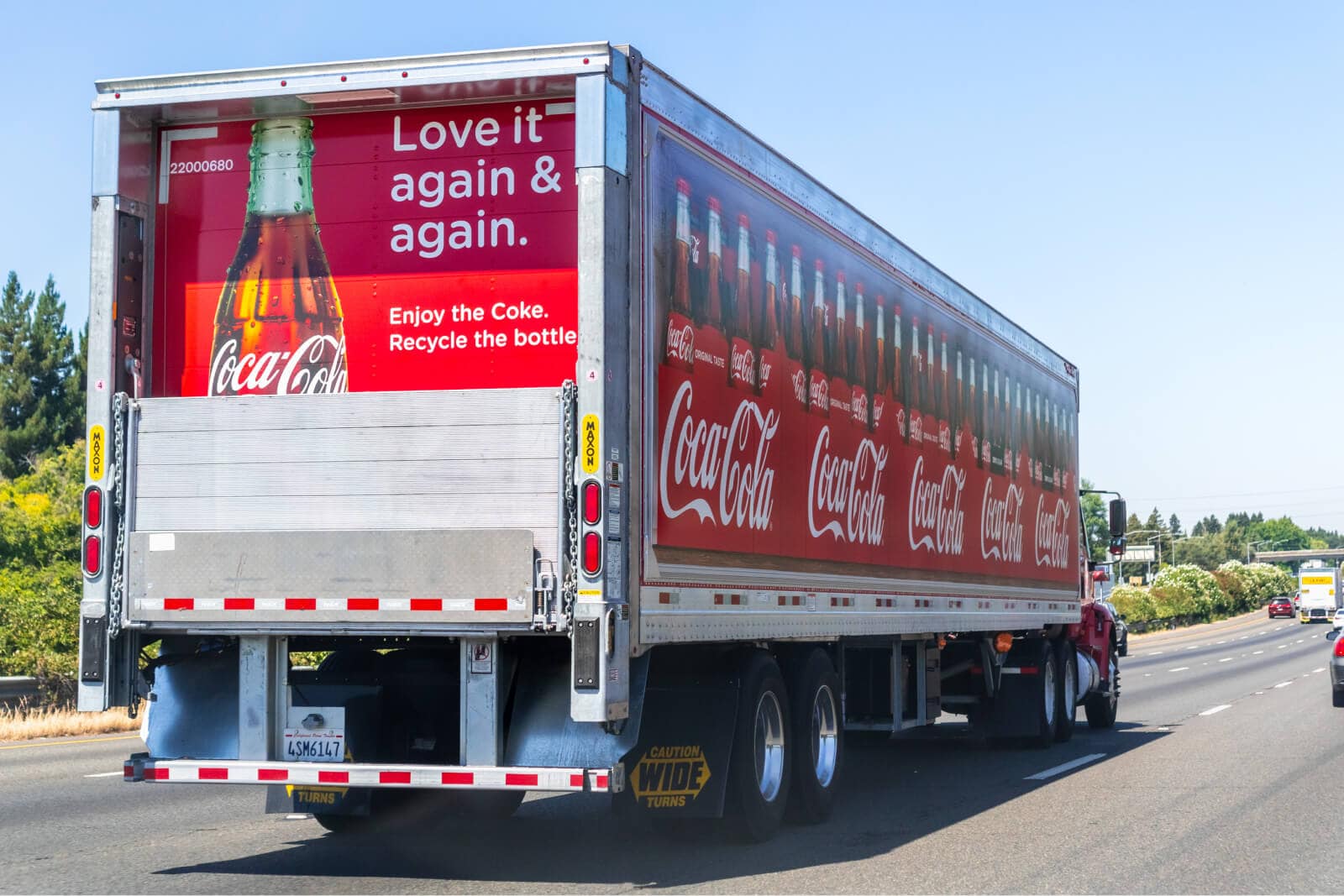
In May 2020, Coca-Cola and Land O’Lakes cut the ribbon on a promising new initiative with the potential to cut total supply chain emissions significantly, while improving both sustainability and profitability along the way.
Working its way along the roughly 380-miles of highway between Akron, OH, and Allentown, PA, was an 18-wheel semi carrying Land O’Lakes butter one way and pallets of Coca-Cola the other. The loads, which arrived at their final destination with no delays, accounted for a total of 1,120 saved miles between the two stops, or roughly 2,500 kilograms of atmospheric carbon dioxide.
As simple as this sounds, collaborations like this have been all but impossible to achieve at scale for the world’s largest shippers, many of whom transport millions of shipments each year. Coca-Cola and Land O’Lakes operate two of the largest supply chains in the US food and beverage industry. Collectively, the two companies move more than 500,000 shipments per year, to destinations located both within the United States and around the world. Using FourKites’ Lane Connect, the two companies discovered that they had roughly 1,400 complementary lanes between them.
For the first time ever, shippers and logistics companies are collecting enough data to paint a digital picture of their supply chains. In the process, they’re discovering opportunities for collaboration and efficiency like never before. Now, in the midst of both a global capacity shortage and an ongoing climate crisis, they saw an opportunity to address both of these challenges by reducing empty miles throughout the supply chain.
“We’ve talked for years at conferences and industry gatherings about the potential of sharing capacity on our overlapping lanes, but the technology we needed to make it happen was never quite ready. Now that it is, the sky is the limit.”
– Rob Haddock, Director of Supply Planning, Coca Cola North America
The United States Environmental Protection Agency (EPA) breaks down sources of greenhouse gas emissions into five distinct sectors: transportation, electricity, industry, commercial and residential, and agriculture. In 2017, transportation emissions surpassed electricity as the single largest sector producing greenhouse gas emissions within the United States. Collectively, the global transportation sector accounted for an estimated 7 Gigatons of greenhouse gases produced in 2018 alone, according to the Intergovernmental Panel on Climate Change.
At the same time, an estimated 40% of trucks travelling on U.S. roadways are empty at any given time. Heavy trucks account for 57% of all logistics-related greenhouse gas emissions, according to the Environmental Defense Fund. Digital freight brokerages such as Uber Freight and Convoy are already playing a part in solving this problem, by facilitating more efficient commerce between shippers and carriers, often for one-off shipments on an ad-hoc basis. The vast majority of under-utilized capacity, meanwhile, remains hidden within dedicated fleets and high-volume carriers moving along contracted carrier lanes.
In addition to the impact this unused capacity has on the environment, it also places artificial limits on the amount of freight that can be shipped at any given time — even critical goods such as food, medicine or personal protective equipment (PPE).
As ongoing capacity shortages continue to drive transportation costs up by as much as 15% or more each year, removing such inefficiencies would have profound impacts on both companies’ bottom lines, and their overall carbon footprint.
“Organizations are under pressure to reduce the amount of waste they’re producing — from consumers and governments alike. The solution to this challenge is a shift towards a circular, waste-free economy. The supply chain will play a key role in this process. Eighty-four percent of participants in Gartner’s recent Supply Chain and the Circular Economy Survey stated that the supply chain has, or will have, decision-making authority when it comes to their organization’s circular economy strategies and initiatives.”
– Steven Steutermann, Managing Vice President, Gartner Supply Chain
Historically, the complex nature of modern supply chains means that in order to implement capacity sharing at scale, companies must first establish a comprehensive system for collecting, analyzing and storing data. Essentially, this means marrying the supply chains of two or more completely independent organizations and identifying common opportunities – in real-time. Without a system capable of doing this automatically, any attempt to identify and share unused capacity will be doomed the moment something goes wrong with one of the shipments, if not before.
Projects like the one pioneered by Land O’Lakes and Coca-Cola represent all three critical elements of successful corporate sustainability initiatives: simultaneous improvements in sustainability, profitability and efficiency.
Currently, many other major companies are using FourKites’ Lane Connect to identify opportunities for shared capacity. According to FourKites’ data, the number of lanes shared among just five of the dozens of companies currently using Lane Connect is enough to yield 17,000 complementary lanes between individual pairs of companies.
“We have data within our four walls, but we don’t understand everyone else’s data, and the back and forth used to really slow us down. To me, the biggest thing that has changed is visibility. We can work faster — together — if we have visibility to each other’s data.”
– Dustin Braun, Senior Director, Logistics at Land O’Lakes.
. . . . . . . . . . . . . . . . .
To learn more about Lane Connect and other opportunities to advance your organization’s sustainability initiatives, contact us!